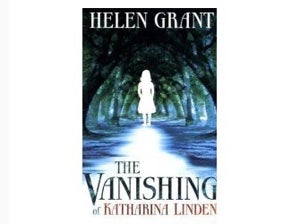The Vanishing of Katharina Linden, By Helen Grant
A tale of disappearing youth

Your support helps us to tell the story
From reproductive rights to climate change to Big Tech, The Independent is on the ground when the story is developing. Whether it's investigating the financials of Elon Musk's pro-Trump PAC or producing our latest documentary, 'The A Word', which shines a light on the American women fighting for reproductive rights, we know how important it is to parse out the facts from the messaging.
At such a critical moment in US history, we need reporters on the ground. Your donation allows us to keep sending journalists to speak to both sides of the story.
The Independent is trusted by Americans across the entire political spectrum. And unlike many other quality news outlets, we choose not to lock Americans out of our reporting and analysis with paywalls. We believe quality journalism should be available to everyone, paid for by those who can afford it.
Your support makes all the difference.When you read The Catcher in the Rye as a teenager (as you should), you tend to think of Holden Caulfield: "What a puncturer of phoniness!" And when you read Salinger's novel again as an adult (as you should), you tend to think: "What a naïve and self-regarding little prig!" Such a shift of point-of-view – from youthful identification to adult distance – is crucial to our response to the child narrator of Helen Grant's The Vanishing of Katharina Linden.
A single encounter with this remarkable novel is all that is needed for us to perform this juggling of perspective. Is the folkloric world of 10-year-old Pia's imagination – with its Brothers Grimm-style perceptions – the best way to approach the disappearance of Pia's friend Katharina, rather than more prosaic solutions? We are allowed – invited, even – to change our mind constantly about the protagonist.
Before we address the dark mystery at the heart of the novel, there is another one: who is this book for? With its juvenile heroine, it would appear to be a novel for teenagers. But the publisher, rightly, also has adult readers in its sights: there's a whole stratum of meaning which will only work on that level.
The German setting of Grant's novel belies her Englishness. She begins with a Dickensian spontaneous combustion. In Bad Münstereifel, Pia finds herself known as "the girl whose grandmother exploded". This accident sets the grim (Grimm?) tone of what follows. Pia is mystified by the disappearance of Katharina; she is the last to see her alive.
The disbelief of the small town is palpable. In a place where everyone knows everyone, who could be behind the crime? As Pia investigates, we wonder if we should take on trust her fey solutions.
It would be churlish to hint at whether the answer is in the realms of the uncanny or is more earthbound, but it's a measure of Grant's success that readers will find themselves shuffling through a wide range of possibilities.
Join our commenting forum
Join thought-provoking conversations, follow other Independent readers and see their replies
Comments